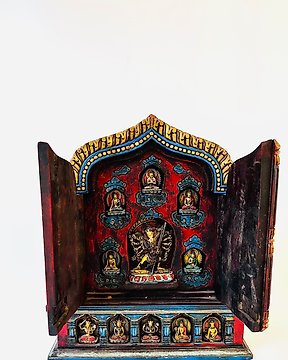
彩绘木材中的 Autei - 尼泊尔 - 20世纪末
编号 83090433

编号 83090433

The Buddha is depicted in dhyanasana pose holding a ceremonial object ( a stupa or pagoda or temple, representing the mind) and with a carved leaf-form mandala behind him.
The figurine has nice detail and a carved dark stone base.
Actual dimensions: 14.5x9x5 cm weigth: 376 gram.
Lu Xing 祿星 is a Taoist god and part of Fu Lu Shou. He stands for prosperity, improvement and rising civil servant positions. Lu Xing is one of many different Cai Shen that exist in traditional Chinese religion. Lu Xing's attributes are the ruyi and the tangerine suit he is wearing.
According to myth, he lived in the 2nd century BC. and was a high mandarin of Emperor Han Jingdi. He was envied by many, including the emperor.
Another myth tells that Lu Xing was called Zhang Yazi during his lifetime and died in a war. His descendants built a temple for him.
The third myth is that Lu Xing is the deification of Zhou Wenwang (周文王).
The last myth is about the worship of Lu Xing from the Jin Dynasty onwards. It was the deification of Shi Chong (石崇). In terms of status, Shi was lower than the emperor, but in terms of income (禄) he was higher than the emperor and was therefore called Lu Xing.
Actual dimensions: 12 x 4 x 2.7 cm weigths: 228 grams
Fu Xing 福星 is a Taoist god and part of Fu Lu Shou. Fu Xing represents the Jupiter (planet) in Chinese astrology. This represents luck. In Taoist legend, Fu Xing is the deification of Yang Cheng, a governor of Daozhou. Yang Cheng risked his life by writing a request to the emperor to save suffering people. After his death, people built a temple for him. Over time he came to be regarded as the god of fortune.
Actual dimensions: 12 x 4 x 2.7 cm weigths: 214 grams
In Japan, these three gods have merged into a single deity: Fukurokuju (the Japanese reading of 福禄寿), which looks more or less like the Chinese Shou. Fukurokuju is part of the Shichi Fukujin.
The worship of these three gods dates back to the Ming Dynasty. According to believers, the placement of the statues of Fu, Lu and Shou can change the fengshui of a house/room. The placement and influence is as follows:
- southwest of a house/room - the gods of luck will protect you when giving birth to a child.
- west of a house/room - they give you prosperity and will protect this prosperity. They also give joy and festive mood.
- northwest of a house/room - they help the father of the house to get the three fortunes.
- north of a house/room - they help bring creativity, happiness and wisdom.
Please take a good look at the photos, they are part of the description.
They provide a clear picture of the quality and condition of the product and they fill in any gaps in the text or correct any errors and are decisive for the description of the product.